Every now and again, social media catches fire with news of a police blitz on caravan safety and towing compliance. Invariably, it goes that on a certain highway, police are pulling over caravanners, weighing the rigs, and issuing fines.
Caravan too heavy for the tow vehicle? Not using tow mirrors? Police around Australia have become more proactive when it comes to enforcing the laws that govern safe and legal towing. And their enforcement powers are very real.
But what actually occurs during a roadside caravan check? And what are the penalties that apply to caravanners who have hitched their wagon to an unsuitable tow vehicle, or who have otherwise broken the rules?
POWER TO STOP
Police have various powers under the national Road Safety Act. The act confers police with the power to stop and inspect any vehicle on the road. They also have powers to ensure motorists follow direction.
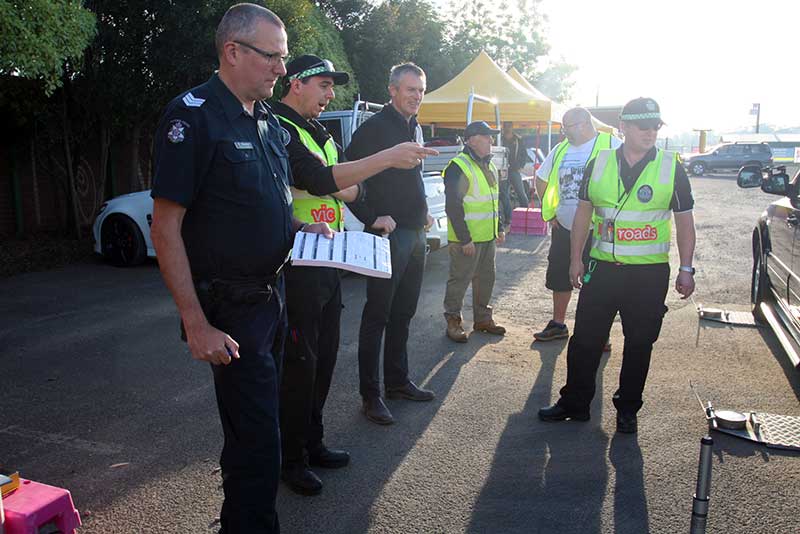
“For instance, if a police officer inspected a vehicle or caravan and found it to be unsafe or unroadworthy, they could direct the owner not to use that vehicle until certain things had been done to it,” Sergeant Graeme Shenton of Victoria Police said.
Sergeant Shenton has been a driving force behind various caravan safety inspections and educational campaigns in in Victoria, having conducted operations in Newmerella, eastern Victoria, and even joined forces with the Facebook group Everything Caravan and Camping and other organisations to conduct free caravan checks at Melbourne Leisurefest last year. And while he speaks from a Victorian perspective, each state has its own ‘road rules’ which are taken from the Road Safety Act. Police powers to stop, inspect and direct are therefore almost identical from one state to the other, Sergeant Shenton told GoRV.
FINES
It’s clear that any caravanner can be pulled to the side of the road by a police officer for the purposes of a compliance inspection. In Victoria, however, the focus remains on education, not enforcement, but Sergeant Shenton warns that may change.
“The conversation that we’ve started in the media among caravanners has hopefully encouraged them to check their vehicle and van,” he said. “We want them to do this not because they might get ‘pinged’ but because it’s the right thing to do – let’s look at prevention rather than booking people.”
But if doing the right thing by your loved ones and other motorists isn’t enough motivation to load your van according to your vehicle’s limits, perhaps a fine will be.
In Victoria – and the applicable fine structure is very similar across the country – police are empowered to issue fines as follows:
- Less than five per cent over ATM/GVM: $238;
- Between five per cent but less than 10 per cent over ATM/GVM: $317;
- Between 10 per cent but less than 15 per cent over ATM/GVM: 634; and
- Between 15 per cent but less than 20 per cent over ATM/GVM: $1580.
WHAT TO EXPECT
At any roadside caravan check, you can expect to have your entire rig weighed. The tow vehicle will be weighed using portable scales to ensure it hasn’t been loaded beyond its GVM, the caravan will be weighed to ensure it’s within its ATM, and a motorhome will be weighed to check it’s within the permitted GVM.
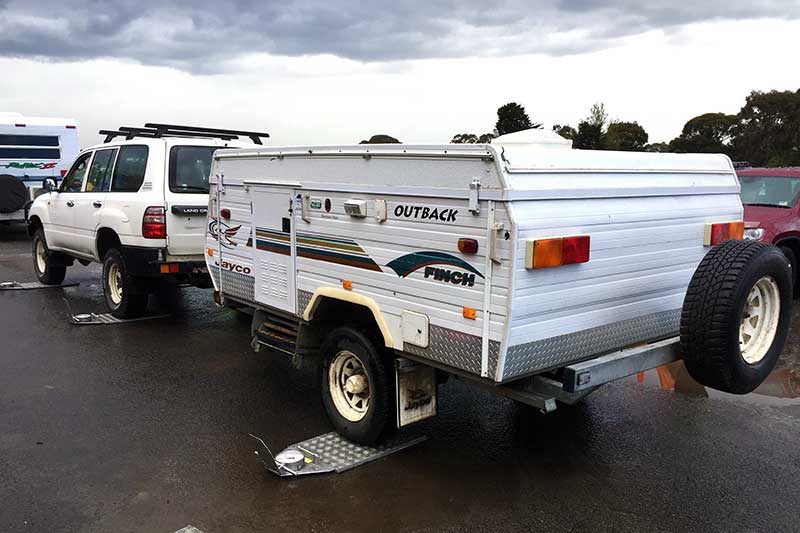 The actual loaded weights will be then checked again the compliance plates of the van and vehicle. In some instances, police will refer to a comprehensive guide to vehicles’ towing capacities published each year by the Australian RV industry.
The actual loaded weights will be then checked again the compliance plates of the van and vehicle. In some instances, police will refer to a comprehensive guide to vehicles’ towing capacities published each year by the Australian RV industry.
Police will also check that all taillights and electrical connections through the trailer plug work, that the tyres are roadworthy, that any additional loads are properly secured, and that the van and anything attached to it doesn’t exceed any dimensional limits. Even D-shackles are checked for adequacy.
The driver will be breathalyzed and have their licence checked, and the van and tow vehicle’s registrations will be checked, too.
What happens if a police officer finds a van to be overweight? Is the driver left to wait on the side of the Hume Highway for a tow truck to collect the caravan?
“With the vast majority of overweight vans we’ve looked at during our inspections, we’ve been able to make some changes that have made them legal again, such as dumping the fresh or grey water in the tank,” Sergeant Shenton said. “Or after weighing the tow car, we might have discovered some extra load capacity, so we’ve been able to move some of the van’s load into the car.
“We do have a duty of care to other road users and to the person we’re speaking to, but police have some discretion. If, for example, the tow vehicle was loaded with a mum, dad and three kids, and there wasn’t anything that could be done to make the setup legal again, it would probably not be wise to leave them stranded on the side of a busy road. In that case, we would look at whether the van was over-engineered, whether the ATM was set lower than the group axle capacity and suspension rating, for example.
“The police can then direct the caravanner to head to the nearest town or caravan park where they can make the necessary adjustments.”
Police also have discretion in terms of whether to issue a fine for an overweight caravan. If, for example, a caravan is over-engineered and the loading infraction is relatively minor, a cooperative attitude will improve the driver’s chances of escaping a ticket.
IGNORANCE IS NO DEFENCE
As far as the police are concerned, the person behind the wheel is responsible for any and all transgressions associated with the towing setup.
Unlike a heavy commercial vehicle, such as a transport truck, in which there is a chain of responsibility from the driver to the person who loaded the vehicle to the owner of the vehicle, compliance responsibility for a light vehicle always rests with the driver.
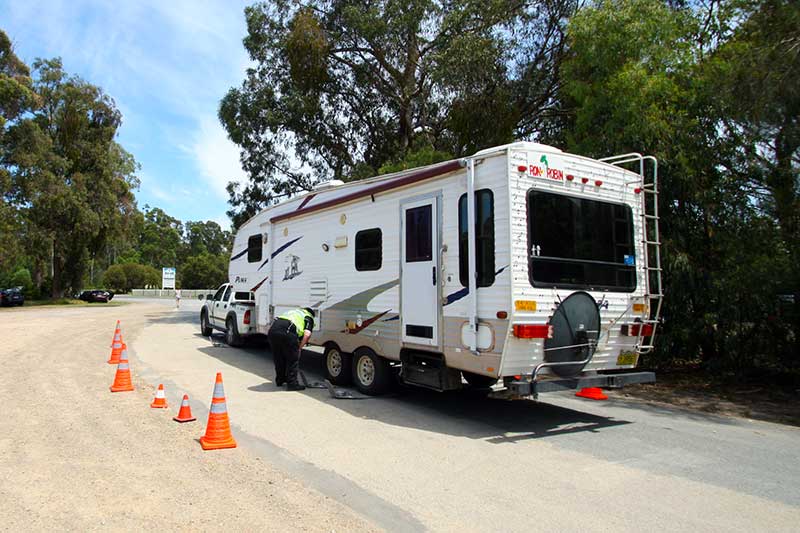 Did a mate lend you the van and vehicle for your family holiday, assuring you that all was fine? Doesn’t matter. The driver cops the fine. Take it up with your mate. If the vehicle and/or van are unregistered, the driver is also liable for any and all fines, regardless of who owns them.
Did a mate lend you the van and vehicle for your family holiday, assuring you that all was fine? Doesn’t matter. The driver cops the fine. Take it up with your mate. If the vehicle and/or van are unregistered, the driver is also liable for any and all fines, regardless of who owns them.
TOW MIRRORS
Are tow mirrors mandatory? This is not a yes or no question. If your factory-fitted side mirrors provide a clear view along both sides and to the rear of your trailer, fine. However, with most caravan and tow vehicle combinations, this is unlikely.
“Some people might say that you can’t see the traffic behind you with tow mirrors but you can if the people behind you are travelling legally – at least two seconds behind,” Sergeant Shenton said. “It’s not your responsibility to see someone travelling illegally behind you.”
But how can a police officer determine the adequacy of a driver’s rear vision in the side mirrors? Easy: a tape measure.
“If tow mirrors aren’t fitted, then during an inspection we will open your two front windows and measure to the outside of both side mirrors, and then we measure at the widest point of the trailer,” Sergeant Shenton said.
However, it is the responsibility of the driver to ensure the correct rearward field of vision and just having the ’tips’ of the mirrors wider than the widest point of the van would probably not be enough. And no, a camera mounted to the rear of a caravan is not a substitute for tow mirrors.
CARAVAN SAFETY
Attitudes towards safe, compliant towing are changing, Sergeant Shenton says. The online conversation among RVers is overwhelmingly now in favour of how to do the right thing, with anyone advocating a less-than-legal approach quickly shouted down by enthusiasts who want to enhance the reputation of the RV lifestyle.
Yes, the days of hitching up a grossly overweight van to an obviously under-rated vehicle, 1970s-style, are well and truly in the past, where they belong. Caravan safety and towing compliance inspections, however, are here to stay and on the rise, whether the police objective is enforcement, education or both. It is as important as ever that vanners take it seriously and make no assumptions as to the towing capacity of their vehicle.
If yours is an unsafe towing combination, a fine could be the least of your worries.
Images: Marty Ledwich, RVeethereyet.com


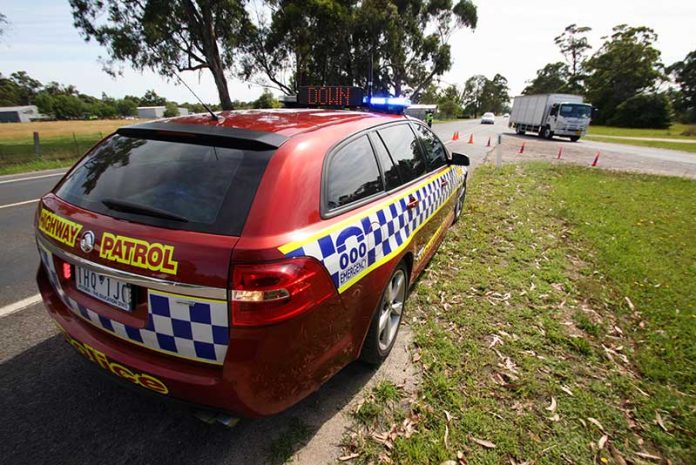
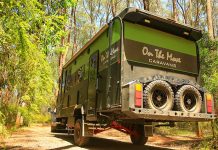
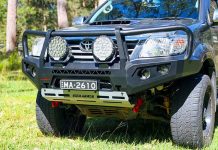
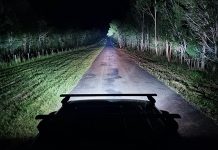

The correspondence about D Shackles on social media sites over the last three to fours stirred up a hornets with vanners. We had a majority of so called experts giving their versions of what you stated in your article about adequate D Shackles. What Road Law, Australian Standard or State Main Road Directive are you using to classify a D Shackle as “Adequate”? Pls explain. Lets put this thing to bed once and for all.
Absolutely bull turds what about boat owners and some.being oversize over 2.5mtr do they need to me accredited NO
just stick a sign on she’ll be right
Also i am in transport and if i put a 3.4mtr wide load on there is no law to say i need to add mirrors to see down my sides as i cant see squat down the side even at about 2.7mtrs wide nothing so why do caravan owners have to abd not boat owners or in transport ask any accredited driver all ya do is flick the indicator and.move over to bad im coming over
Great article, as one month in as apprentice Grey Nomads with our 1st van, the article states that its the drivers responsibility & ignorance is no excuse, so please excuse my ignorance, how do we actually check that the weight distribution, ATM, GVM, towball weight etc is all ok before we get pulled up on the side of the road by the police??
Search the internet for public weigh bridges. There are some at big roadhouse service centers. Take someone with you to make it easier. Preferably fully packed ready to go, a couple of days before leaving so you can adjust your rig.
Is there anywhere in Victoria I can take my loaded van to get weighed and to check I comply with all necessary components? The whole process is very daunting to a newbie like me, I want to do the right thing, but do worry I may be close to overweight with our caravan. I also would like to know that I have spread weight evenly in caravan as I have read about caravan sway due to excess weight in back of caravan. I am also aware that too much weight in back can reduce towball weight and this can also be dangerous. Who can give me some advice – I want to get the caravan inspected. Thankyou
Hi Nikki, a lot of Vic country towns have a public weighbridge. Some highway weighbridges give you the option to self test your compliance. Towball weight scales are available at Supercheap.
I can’t see why a rear mounted caravan camera can’t be used legally instead of mirrors. My camera is on 100 % of the time and feel confident that I can see what’s behind me. That’s wasn’t the case when using clip on mirrors that were ‘legal’
Totally agree … never felt safer or more courteous than when I installed always on rear camera on van. Actually think this should be a legal requirement. Like Tom dick reality should play a major role.
A rear camera won’t show a vehicle beside the van
No but your mirrors will.you can not see motor cyclist in side mirror but on rear camera you can.
That’s what the standard side mirrors are for. My rear video camera can see an overtaking vehicle at the same time as my side mirrors (until he gets almost immediately beside the van, of course. Then he’s obviously visible in standard side mirrors).
Exactly its the stupid laws being 100years behind the times yet woe betide the driver if hes a gram out in weight.
As an older generation caravanner I wholly support the education of caravanners learning how to load (and balance) their rigs and vans. There is a lot of education around about GVM, ATM, Towball weight and how they are all connected. In Victoria there are many government weigh bridges that can be used while they are not manned. They have digital displays constantly on so that anyone can drive on without incurring a cost. There are also some freeway service centres that have weighbridges (but these have to be paid for – about $30). Multidecks (several wieghbridges in tandem) can be used for the tow vehicle, the caravan jockey wheel and the caravan wheels all being weighed seperately at the same time. Single deck weighbridges can be first used to weigh the tow vehicle (with caravan attached) then the tow vehicle with the caravan jockey wheel taking the weight off the car (jockey wheel off the ramp) and then the caravan only on the deck. This procedure will give the three weights that are required to check all three parts of the safety check. It IS the drivers responsibility to know that his rig is legal and the more that the authorities do to assist in this education the safer we will all be.
I have been complaining on various forums about this very subject and i’m On the police’s side on this one. Even to the point of getting our recently acquired 2nd hand caravan booked in for an ATM upgrade so I can be within the law. Currently the chances of getting pulled up are minimal but if I had an accident and I was 1kg overweight the insurance company would refuse to pay out.
This is good to see that police are checking Caravans and Weights. But Different States have different laws , If these check inspections are going to take place then all states should get together and make one rule across Australia.
Interesting statement regarding extension mirrors if required. As a person who operates and provides training in this field, I have have a different view to this from authorities.
Is there a requirement for the tow vehicle to have a greater mass that the towed vehicle?
If so what is that relationship.
Regards
Ernie
Ernie,you can have a 2200kg car rated to tow 3500kg. The car’s towing capability is determined by the manufacturer and is dependent mostly on the chassis strength.
the caravan cannot weigh more than the GVM of towing vehicle this is being enforced taking a lot of caravanners by surprise
I would be careful getting my rig weighed at smaller weighbridge or country town weighbridge. My rig was 300 kg over at one place and around the corner 450kg over the rated weight. This is brand new, no load straight out of the box, that left me in a dilemma and a panic, how do I pack if I’m already over the max. I, like most of the travellers out there I wish to do the right thing. I spoke to a fellow that checked weighbridges, all types including major weighbridges and scales at van manufacturers. These country weighbridges are not worried about a few hundred kg either way, especially after a long grain season with hundreds of B double crossing there paths. His suggestion was trust the “reputable” manufacturers rating and weigh everything on to the van first time(don’t forget the water). Make sure your at least 150kg under max to allow for rocks and shells that the kids pick up along the way and you will be legal. And why is it not acceptable/legal to have a camera on the back of the van instead of mirrors ???( I have both) The camera is a much safer option, you can see everything regardless how close they are.
Until the lens is covered with dirt.
What stupid comment
how are we to comply with our cars, then our vans when the whole weight issues cant be address
cars listed at different weights on compliance place than actual weights, same as vans
then no weigh bridges around to do all axles together connected
example : car & van are 200kg under GCM but car is over GVM by 200kg as the tow ball weight is moved from the van to the car , so when connected the van is 220kg less (towball weight) so am i now pulling 2350kg or 2130kg , van is a single axle Off Road with HD chassis, suspension etc, car is a 120 series Prado with some accessories fitted that now make it over weight on 1 axle but not the other, in standard trim the prado only has around 50kgs left on the front axle before it’s over weight
So angry when I read this VicPol understanding of the Vehicle Standards, I send it directly to VicRoads compliance and standards team asking who allowed this crap.
Agree with some comments above about mirrors and cameras, yes ADR14/02 allows this practice and has been discussed nationally under the national standards and we sort to ensure it is covered under the NTC rules this year so this crap messages are not used.
The national agreement on safety chain connectors, led to the new Administrators Circular 0-3-2, there is no state or local laws, so go break the bank.
ATM is the only fiqure required on the ADR to be shown on a Light Trailer, and Gross Combination Mass (GVM) is a manufacturers recommendation, not a requirement under the Fed’s RVD or registration records, so what are you going to fined against, what standards.
Disappointed
I believe the tow vehicle has to be at least 10 percent heavier than the van… however, it appears to vary state to state.
Logically though, if th van isn’t heavier than the car, you have FA chance of stopping in an emergency – even with brake assist on the van.
The oth rnthing I don’t understand is why it’s not compulsory to have an anti sway system installed on vans…. seems like such common sense to me.
We tow a 22 foot van with a LC200 2016 model. We upgraded the GVM on the car to cope with extra weight. Expensive, but worth it we think.
No such 10% rule Kerry, again confusion is king yet the Experts never help with real advice.
You have to look at your vehicles ratings +The vans compliance plate and add up everything thats on the van except the empty gas bottle-that includes awnings battery, mats goods food everything. Also search for info about adding ball weight to the cars mass ( I just forget how it works) and then you have to tally up the car its occupants and cargo and dd to Tare plus I think the ball weight (they include a tank of petrol and usual fluids in the tare).This must all be under the vehicles max rating. Then Add this to the vans all up weight to obtain the Gross weight of the car and Van
If under the cars makers specs your legal if over you are not!
and 60KGs over on my small outfit for example is $238 fine @ 5% over.
BUT you can bet the Police have feather accurate scales to nail you with.
Now heres some more = every van is different re weights even if it was made on the same day and the same model. so Chat board examples are just that only and often wildly inaccurate. The Vehicle manufacturer states one thing in the manual but a local Australian dealer sticks in specs massively over what the American maker such as Jeep has. So you have to rely on faith here (and no the dealer has zero idea why so even bother to ask). RV experts also seem to have trouble giving any semblance of a concise answer.
Hi I too Upgraded my 200 toyota 2017 to 3800kgs as,I have seen all types utes and 4x4s these are over weight, with boats on roof racks, boat trailers on rear and jerry cans, which is just an abuse of our saftey and law that is why I agree with the law also,I also agree creeps that do not dump there waste in the correct spot should be fined or moved on, it is not to hard to follow some simple rules ,Thanks GJ
Totally agree it’s time to make caravanning safe and legal. we spend big dollars on these rigs so let’s allocate some time and money to ensure compliance. And while on it make the builder’s of Van’s accountable for their part in this process, dont make a van thats that close to ATM before you load it up.
Lets add a license endorsement to mix a well.
Lets not start playing Stockholm syndrome and create an even worse nanny state it just engenders mindless drones. Lets demand the Transport/Rego groups, The manufactures and the police provide real, understandable and clear guides not the utter BS we now have. Half of it was not based on engineering but on marketing and misinterpretation by the so called experts.
(I can assure everyone that even the hyper regulated airlines have purchased the wrong test equipment to complete some critical tests and still cant figure out what the issue is Nor will they listen.)
So what chance does the motoring public have?.
Hi guys..Mazda BT-50 2660 kg. 2 adults , full tank of fuel, tool kit jumper leads at a weigh bridge.
I add fishing gear and surf board and it comes in at 2700 kg. Plus Tow ball mass of 200 kg.
All up 2900 kg.
Van’s tare is 2860 kg. minus 200 kg tow ball plus generator plus outdoor stove plus gas, clothes, fuel etc etc. Comes in at 3000 kg without water. Roughly 340 kg for junk.
Blind Fred can see its marginal at best with the car i have weighed. The van i’m yet to pick up however and I’m simply aiming for a GCM of 6000 Kg given the car is ok the van is ok and the tow ball weight is fine.
But all in all from the little i have read is that most either don’t care or simply don’t get the reg’s.
I do feel however that caravan sellers will sell ice to the Eskimo’s given half a chance and there facts are none to flash. Working on the yarn ” Oh your car can pull 3500 kg….sure it can but a big reduction in the GVM of the car.
Thats a perfect example of people being numbed by complexity having to default a simple point they can understand, And thats the ones that really care.
It seems to me that caravan manufacturers have a lot to explain and a moral obligation to the caravaning fraternity to get their act together and produce vehicles that deliver user- responsible product that meet the law requirements.
My van has a payload limit of 400 kgs. That is a joke when you considder that the compliance plate is stamped with a weight that does not include the awning, gas, water or our camping and living needs.
Absolutely !! but dont expect much from an almost backyard type capability industry that cant even seem to produce a decent product .
It would be nice to have a clear and I mean clear set of guidlines put out by The Road transport people WHEN you register, re Register otr transfer a van etc. As a new van owner I had no such idea. Massive internet searching and wading through mountains of BS on forums helped me gain some insights so my very Technical and common sense oriented barin could “eventually” work it out. Then we have to contend with the written law Police interpretation and reality such as rear view cameras. After all that nonsense I am still somewhat un comfortable even though I have my weights etc all down on paper. As for weigh bridges many in my area at least seem awfully daunting to get to traffic wise and navigate especially for a newbie. Time the industry pulls its holier than though finger out and help.
SICK OF THIS hoons doing burn outs, P platers driving into houses, drunks and drug drivers abound , drivers with no license no insurance, no brains …..BUT lets start stopping holiday makers they will probable pay there fine .
I’m with you Mel. We are easy targets for revenue raising.
I’ve been towing camper trailers and vans for nearly 40 years, the majority with a tinnie on top and probably overweight. I have never had an accident and never caused an accident, but the nanny state we now suffer makes me a criminal.